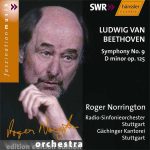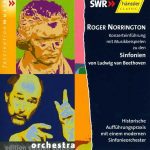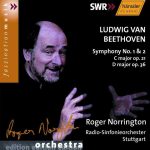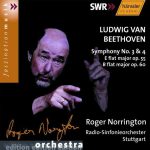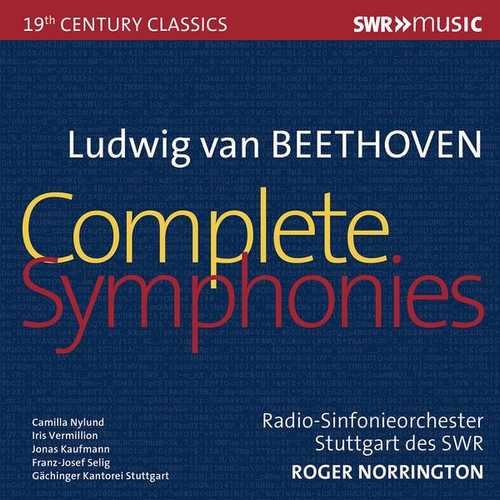
Composer: Ludwig van Beethoven
Performer: Camilla Nylund, Iris Vermillion, Jonas Kaufmann, Franz-Josef Selig, Gächinger Kantorei
Orchestra: Radio-Sinfonieorchester Stuttgart des SWR
Conductor: Sir Roger Norrington
Number of Discs: 5
Format: FLAC (tracks)
Label: SWR Music
Catalogue: SWR19525CD
Release: 2020
Size: 1.4 GB
Recovery: +3%
Scan: yes
CD 01
Symphony No. 1 in C major, Op. 21
01. I. Adagio molto (Live)
02. II. Andante cantabile (Live)
03. III. Menuetto. Allegro molto e vivace (Live)
04. IV. Finale. Adagio – Allegro molto e vivace (Live)
Symphony No. 2 in D major, Op. 36
05. I. Adagio – Allegro con brio (Live)
06 .II. Larghetto (Live)
07. III. Scherzo. Allegro (Live)
08. IV. Allegro molto (Live)
CD 02
Symphony No. 3 in E flat major, Op. 55 ‘Eroica’
01. I. Allegro con brio (Live)
02. II. Marcia funebre. Adagio assai (Live)
03. III. Scherzo. Allegro vivace (Live)
04. IV. Finale. Allegro molto (Live)
Symphony No. 4 in B flat major, Op. 60
05. I. Adagio – Allegro vivace (Live)
06 .II. Adagio (Live)
07. III. Allegro molto e vivace – Un poco meno allegro (Live)
08. IV. Allegro ma non troppo (Live)
CD 03
Symphony No. 5 in C minor, Op. 67
01 .I. Allegro con brio (Live)
02 .II. Andante con moto (Live)
03. III. Allegro (Live)
04. IV. Allegro (Live)
Symphony No. 6 in F major, Op. 68 ‘Pastoral’
05. I. Erwachen heiterer Empfindungen bei der Ankunft auf dem Lande. Allegro ma non troppo (Live)
06 .II. Scene am Bach. Andante molto moto (Live)
07. III. Lustiges Zusammensein der Landleute. Allegro (Live)
08. IV. Gewitter. Sturm. Allegro (Live)
09. V. Hirtengesang. Frohe und dankbare Gefühle nach dem Sturm. Allegretto (Live)
CD 04
Symphony No. 7 in A major, Op. 92
01. I. Poco sostenuto – Vivace (Live)
02. II. Allegretto (Live)
03. III. Presto (Live)
04. IV. Allegro con brio (Live)
Symphony No. 8 in F major, Op. 93
05. I. Allegro vivace e con brio (Live)
06 .II. Allegretto scherzando (Live)
07. III. Tempo di menuetto (Live)
08. IV. Allegro vivace (Live)
CD 05
Symphony No. 9 in D minor, Op. 125 ‘Choral’
01. I. Allegro ma non troppo, un poco maestoso (Live)
02. II. Molto vivace (Live)
03. III. Adagio molto e cantabile (Live)
04. IV. Presto – Allegro assai (Live)
Conductor Roger Norrington’s performances of Beethoven were controversial in the 1980s when he first offered them; they were controversial in 2002, when he conducted these performances with the late, lamented Stuttgart Radio Symphony Orchestra; and they remain controversial in this 2020 release, even if perhaps as time goes by they become more permanent fixtures of the landscape. Norrington here transferred his historical performance techniques to a modern-instrument orchestra. His trademarks are present: fast tempos that follow the metronome markings from late in Beethoven’s life, ignored by most musicians, avoidance of vibrato, and punchy accents that bring out the wind and especially the brass parts. Whatever one thinks of Norrington’s readings, it’s not possible to claim that he is imposing a system on the music: his readings are detailed and careful. The attraction of this set is that he has a modern orchestra that can follow him through the changes he applies to the Beethoven symphonies.
Consider the first movement of the Symphony No. 6 in F major, Op. 68 (“Pastoral”), wonderfully delicate despite the high speed. It’s worth noting that Norrington is extrapolating backward regarding the tempo for most of these works; Beethoven didn’t get a metronome (and it may have been a defective one) until the mid-1810s. The Andante cantabile of the Symphony No. 1 in C major, Op. 21, is a brisk walk indeed, but it does remain cantabile. The problem with Norrington’s approach is that when Beethoven does mark a movement Presto, in the Symphony No. 7 in A major, Op. 92, he has nowhere to go: his Presto is hardly faster than his other Allegro movements, and in the finale of the Symphony No. 9 in D minor, Op. 125, he doesn’t brutalize the singers with the logical conclusion of his proportions; that movement is brisk but not overly rapid. Again, all these movements, and all the rest of them, are well crafted, and ultimately listeners must decide for themselves about Norrington’s approach, which has certainly proven itself durable. The original sound quality and the mastering from the new SWR Music label are unusually good.
In recording Ludwig van Beethoven’s nine symphonies with the SWR Radio Symphony Orchestra Stuttgart, its principal conductor Sir Roger Norrington presented a summary of his life-long work with the composer’s music. He applied the insights of historically informed performance to a modern symphony orchestra. For Norrington, historically informed performance does not mean making exclusive use of historical instruments, but includes remaining as faithful as possible to phrasing, articulation and dynamics, and following the tempi prescribed by Beethoven himself.
During the 2002 European Music Festival, Norrington and the Radio Symphony Orchestra Stuttgart set out to prove that a modern symphony orchestra could play the nine symphonies in accordance with the most recent “artistic findings”. Their impressive achievement filled the Stuttgart audience with enthusiasm for its sensational and revelatory performances. The live recordings of the symphonies made during the five concerts document the astonishingly high level at which the orchestra performed. Presenting Beethoven’s symphonies in the order of their composition was the dramatic concept of this cycle of concerts that is duly captured on these recordings. Since the symphonies were performed at the festival in the order in which they were composed, they are found on the discs in combinations that are unusual, but chronologically accurate.
